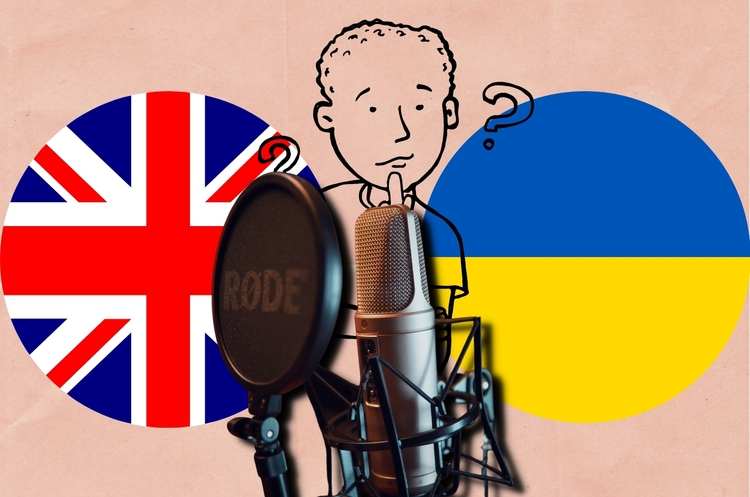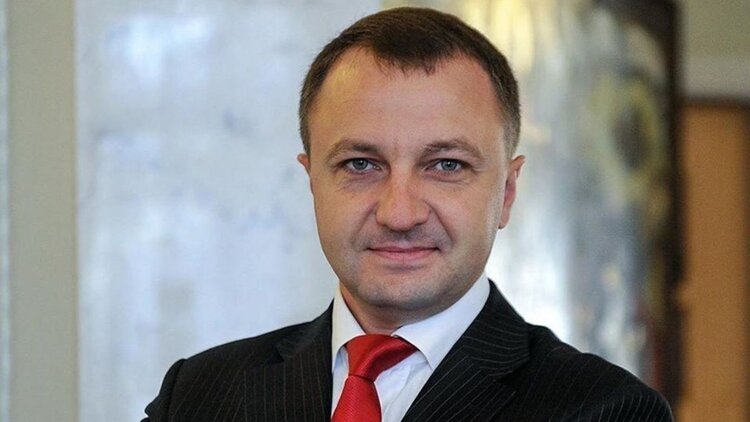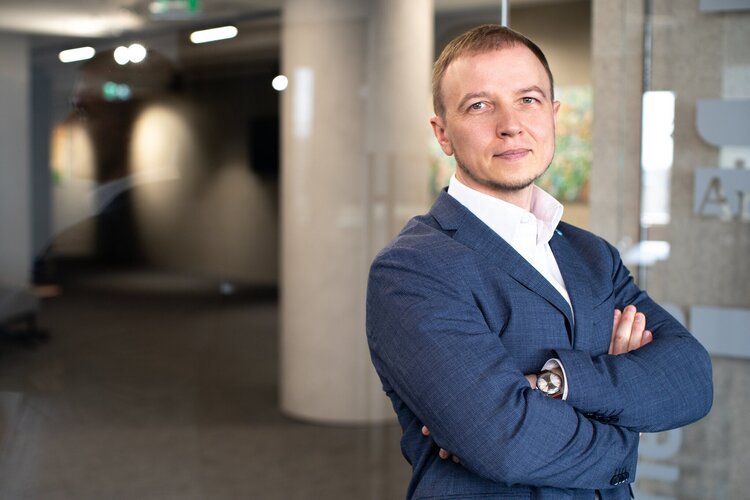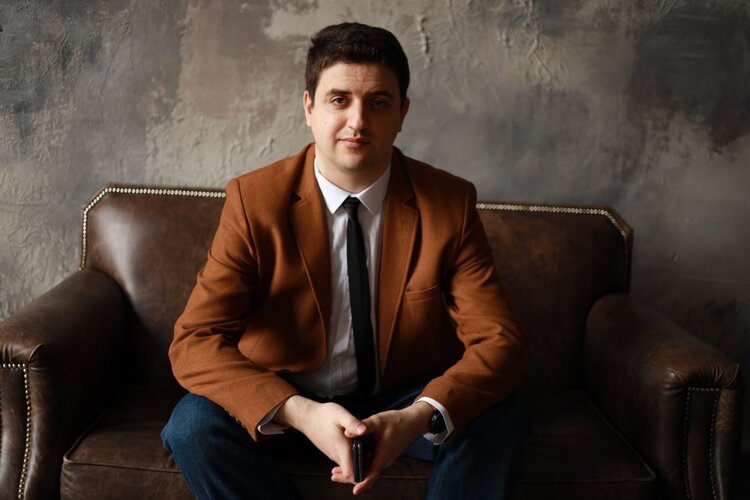Do you speak English? Will the 'English-language' bill kill the domestic dubbing and film distribution industries?
And how it will affect society and culture in general?

While walking with my dog on one of the streets in Kyiv, I became an accidental witness to a phone conversation. A woman who appeared to be slightly in her 40s and was actively discussing her English language skills with her friend:
– You said you could communicate at a basic level… That you have some sort of intermediate level, – she insisted. – Isn't that right? How do you plan to continue working then?
Clearly, I overheard an intense discussion sparked by the proposed Bill No. 9432 "On the Use of the English Language in Ukraine" put forward by the President of Ukraine. The bill aims to expand the influence of the English language in our country, raising its proficiency level among public servants, educators, healthcare professionals, and representatives of various sectors of society.
However, citizens' particular attention was drawn to the reduction in the number of films dubbed in Ukrainian in cinemas between 2025 and 2027. Instead, the bill suggests screening English-language films with the original audio tracks accompanied by Ukrainian subtitles. This entails a gradual decrease in the share of Ukrainian-dubbed films, starting at 50%, then 25%, and eventually a complete replacement of dubbed English-language films with Ukrainian subtitled originals.
Almost simultaneously with the publication of the draft bill's content, a video appeal from members of the Creative Union of Actors-Dubbing Artists emerged, calling for a review and adjustment of the proposed regulations regarding film dubbing. This sparked lively discussions among opinion leaders and ordinary users.
In search of truth, Mind turned to experts in the film industry and specialists in Ukrainian legislation. Regarding the shortcomings and potential advantages of Bill No. 9432, we spoke with Maryna Markovych, the Chief Operating Officer of Postmodern Studio, which handles Ukrainian film dubbing for cinemas and Netflix; Denys Ivanov, a Ukrainian producer, film distributor, and head of the Arthaus Traffic film company; Taras Kremin, The State Language Protection Commissioner; Taras Kysly, a lawyer and co-head of the Intellectual Property and TMT (Technology-Media-Telecommunications) practice at Arzinger law firm, as well as Kostiantyn Zerov, a lawyer at Molotai & Partners law firm.
Maryna Markovych, the COO of the dubbing studio

– How do you feel about the bill regarding the implementation of the English language, specifically its section concerning the screening of English-language films in their original language?
– I would like to get more clarification from the authorities regarding the reasons for including this provision in the law. Personally, I don't find enough arguments in its favour. From a social standpoint, it restricts the use of the official language in favour of another non-official language within a segment of culture. From an educational perspective, learning a foreign language through film viewing is a rather unstructured methodology. It will only develop one skill in the long run – auditory comprehension. From a dubbing business standpoint, it means a complete halt in financial revenue from foreign film producers, who actually finance the dubbing of films in the language of the country where they are released. Therefore, it results in losses for the Ukrainian economy.
– What percentage of English-language films does Postmodern Studio approximate to dub during the year?
– Out of the total number of cinematic releases, it's about 35-40%.
– Domestic cinemas switched to Ukrainian dubbing as early as 2006. What is the secret to the success of our dubbing and localisation?
– As for 2006, I can only speculate. I believe that at that time, the creative industries were not in the best state, but there were competent and talented individuals who wanted and could work in the film industry, and there was no shortage of such individuals. Therefore, when everyone got the opportunity, they gave it their all..
Translators didn't just translate the material; they adapted the dialogues, essentially becoming co-authors of the Ukrainian version. Voice actors fully embodied the emotions of the screen characters through their voices, directors selected vocal ensembles, fine-tuning every line, joke, and tear to appeal to our audience, allowing Ukrainian to harmonise organically with the voices of Hollywood stars.
Sound engineers gained experience from their colleagues abroad in film sound production and successfully implemented it here. It was a chance and a breath of fresh air for everyone. All the pieces fell into place, and the first Ukrainian cinematic dubbing projects burst onto the screens, setting a high standard of quality for all subsequent endeavours.
– How do you think this bill will prompt filmgoers to turn to piracy, and will the situation worsen compared to the current state?
– Undoubtedly. In our country, the conscious consumption of intellectual property has only recently started to develop, and people have gradually begun to subscribe to streaming services. However, I believe that this is only true for certain segments of the population.
Many people still resort to various pirate websites to watch films, choosing one of the many pirate audio tracks available. Personally, I have noticed that even people who have a streaming subscription still visit pirate sites to watch the same series. When asked why, I hear the response, "There are no subtitles available anywhere." Therefore, if you remove the option for dubbed films, the demand for pirate productions will only increase.
After the COVID-19 pandemic, the film industry has just begun to recover worldwide. People have become used to staying at home, watching movies on their laptops, and ordering food delivery. Going outside has taken a back seat. Consequently, the audience needs to be reintegrated socially and motivated to come to cinemas.
If we completely replace Ukrainian screenings with English ones, instead of simply adding the option to watch films in their original language, the lion's share of people will return to watching movies at home on pirate platforms. Meanwhile, cinemas will suffer financial losses.
Therefore, it seems reasonable to me not to replace Ukrainian-dubbed films with English ones but to offer additional screenings in the original language also at a convenient time. This would contribute to an increase in the variety of films shown in cinemas, support film distributors and cinema chains, and attract more streaming platforms and cable channels to the country where Ukrainian viewers can enjoy both original content and content localised in the Ukrainian language. In other words, give people a choice.
As for the learning of English, we should revise not only educational standards but also the standards for English language teachers. Launching social language courses for both English and Ukrainian learning would be beneficial. There are many other measures that need to be taken before considering a ban on Ukrainian cinematic dubbing.
Denys Ivanov, producer and film distributor

– What is your stance on the new bill regarding the implementation of the English language proposed by President Zelensky?
– My position is strongly negative. The provisions laid out in it will not contribute to the learning of the English language or the development of film distribution in Ukraine, nor will it promote the development of the Ukrainian language. Cinema audiences represent less than 10% of the population.
Of those, over half go to cinemas at most once a year, primarily for children's or family content. In most countries, this type of content is dubbed because children cannot read subtitles. Therefore, the share of the family film market may disappear.
There are also viewers who do not enjoy reading subtitles. The culture of dubbing has been built over decades, and it will be challenging to change it in just one or two years.
The bill does not affect television or the Internet, which viewers use more than cinemas to watch dubbed English-language films.
Most likely, people will choose a convenient option for themselves to watch dubbed or voice-over content in the Ukrainian language on television or platforms instead of going to the cinema. This will further reduce the film market, which has already suffered from the pandemic and russia's full-scale invasion of Ukraine.
We struggled to transition to the Ukrainian language in film distribution. Many viewers felt that their rights were being violated. Only now can we speak of a stable consensus on this issue. Taking a step back in promoting the Ukrainian language, which not everyone speaks well yet, is a bit premature.
Most likely, people will choose a convenient option for themselves to watch dubbed or voice-over content in the Ukrainian language on television or platforms instead of going to the cinema. This will further reduce the film market, which has already suffered from the pandemic and russia's full-scale invasion of Ukraine.
We struggled to transition to the Ukrainian language in film distribution. Many viewers felt that their rights were being violated. Only now can we speak of a stable consensus on this issue. Taking a step back in promoting the Ukrainian language, which not everyone speaks well yet, is a bit premature.
– Recent investigations by Skhemy (“Schemes”) and TV Toronto (Ukrainian media – Mind) have shown that some Ukrainian distributors buy film rights through russians. Obviously, even after Ukrainian dubbing, viewers may unknowingly be sponsoring the enemy. If the new bill is passed, will it be possible to improve the situation of purchasing rights for foreign films without russian intermediaries?
– How can the bill protect the Ukrainian film market? It can't. The localisation of films, one way or another, is the responsibility of the film distributor. And if they acquire their rights from a russian company or a front company, it does not solve the problem of protecting Ukraine's film market.
The problem of purchasing content from russians can be solved if the Ukrainian State Film Agency does its job. The law prohibits the State Film Agency from asking rights holders whether they trade with russia or directly with Ukraine. However, the law allows the State Film Agency to conduct explanatory work. Furthermore, it obliges the agency to formulate state policy rather than just perform limited mechanical functions. The State Film Agency and other bodies need to take certain steps to rid the Ukrainian film market of the influence of the russian film industry. Let me remind you that the latter represents a state that has waged an existential war against us.
– Arthaus Traffic is a distribution company that showcases quite successful cases of screening films in their original language with Ukrainian subtitles. Why is it important to occasionally pay attention to watching subtitled films?
– We are one of the domestic leaders in screening films in their original language with subtitles. Few have released more films in our cinema distribution that had the original soundtracks and subtitles. Until winter this year, films dubbed in Ukrainian were exempt from value-added tax (VAT), while films in their original language with subtitles were subject to VAT. This was aimed at the development of the Ukrainian language but also led to a conscious or unconscious reduction in the market for original subtitled versions. It changed the audience culture and created additional accounting burdens for cinemas, as they had to keep separate records for subtitled films.
Of course, we would like to see a state programme that helps businesses change audience culture. There are many advantages to subtitles. We see the film as the author intended it. We hear the original voices of the actors because they are not physically removed in dubbing. Unfortunately, such a programme does not exist yet. Moreover, the release of a film with subtitles had certain economic consequences for those working in the industry..
– What opportunities do you see for the development of the Ukrainian film industry through this bill, and what gaps still need to be filled?
– I believe that this bill is not aimed at developing the film business. Rather, it is more likely to lead to a reduction in cinema distribution and the market. It needs to be reconsidered, at least in terms of its impact on cinemas. The proportion of English language learning through cinemas and subtitling is certainly non-existent.
– Is a surge in the popularity of illegally dubbed films possible due to this law?
– You don't need to be a great sociologist to understand that this is exactly what will happen. People will seek content elsewhere instead of watching a film in Ukrainian with their children at the cinema. Cinemas are already a paid outlet, and they have their own schedules that viewers have to adapt to: buying tickets, finding company because people don't often go to the cinema alone. Most often, they go with family, friends, or loved ones.
People may turn to illegal resources to watch their desired films with dubbing or voice-over. This will include pirate sites with russian dubbed versions. Both the Ukrainian language and its promotion will suffer as a result..
Taras Kremin, The State Language Protection Commissioner

– Opinions of people who have studied or simply heard about the new draft law on the implementation of the English language have been significantly divided. You are not a supporter of this draft law. I would like to hear your arguments.
– I generally support the idea of creating favourable conditions for Ukrainians to learn and use the English language. This draft law contains many valid proposals; however, in its current form, it cannot be accepted as it narrows the scope of application of the state language.
The main concern is the provision regarding the mandatory demonstration of English-language films in the original language with Ukrainian subtitles instead of mandatory dubbing or voice-over in the state language. Many experts rightly argue that this is a major blow to the film industry, particularly to Ukrainian dubbing.
Furthermore, this restricts the rights of Ukrainian citizens to access information and services in the state language, as certain categories of viewers may be deprived of the opportunity to watch foreign films in cinemas altogether. This violates both the Constitution of Ukraine and contradicts the decision of the Constitutional Court of Ukraine dated July 14, 2021. Therefore, such changes are unacceptable.
I have serious doubts that this provision can in any way contribute to the main goal of the draft law – promoting the learning of the English language in Ukraine.
Undoubtedly, English language proficiency is necessary for military personnel, scientists, ministers, and heads of state enterprises, as Ukraine has constitutionally committed to a steadfast course towards NATO and the EU. That is why the necessity of foreign language proficiency will soon arise for every citizen. However, the problem of achieving proficiency does not lie in narrowing the scope of application of the state language. It is a matter of the education system.
Currently, everyone learns English for 11 years in school and then for 5 years in higher education institutions. But what is the result? Can the average citizen go and pass an English exam at least at a B2 level, which allows for fluent use of the language for learning, work, communication with foreigners, or living in an English-speaking environment? I am convinced that the answer is no. Therefore, this issue pertains to changing teaching methods and adopting new approaches to language learning in educational institutions.
I hope that the draft law Bill No. 9432 "On the Use of the English Language in Ukraine" will be revised by the Parliamentary Committee on Information and Humanitarian Policy, taking into account all the feedback, in the near future.
– In some European countries, such as Cyprus or Scandinavian countries, there is the option to watch films with both subtitles and dubbing in the language of the country where they are being shown. If the new draft law proposed a similar option for our citizens, would you support it or not?
– Our legislation already allows the screening of 10% of films in their original language with subtitles. The Zhovten cinema in Kyiv holds the most screenings of this kind. Unfortunately, according to the cinema's management, attendance at such screenings is critically low. If there is no Ukrainian dubbing, people will stop going to the cinema and will seek out pirate film websites. And there, it will be in russian, which poses a threat to national interests.
– How has the situation with the implementation of the Law "On Ensuring the Functioning of the Ukrainian Language as the State Language" changed, and is it worth introducing English as a second language for civil servants, healthcare professionals, military personnel, and representatives of other sectors?
– Any attempts to apply a bilingual regime in Ukraine are unconstitutional. After decades of artificial Soviet and post-Soviet totalitarian bilingualism, where the Ukrainian language was effectively replaced by the russian language, we need to consolidate society around the state language.
I would like to quote a fragment from the decision of the Constitutional Court of Ukraine dated July 14, 2021, regarding the constitutionality of the Law "On Ensuring the Functioning of the Ukrainian Language as the State Language": "The bilingual regime in the public space by mixing the Ukrainian language with any other, particularly when television or radio broadcasting is carried out simultaneously in Ukrainian and another language in audio form, not only violates the citizen's right to receive information in the state language but also externally narrows the scope of Ukrainian language usage, undermines its system from within, distorts its structure, and creates grounds for its internal decline."
Regarding English language proficiency for civil servants, I would like to remind you that the civil service reform began during the 8th convocation of the Verkhovna Rada of Ukraine. By the way, when I submitted my documents for the position of Commissioner, my English language proficiency was also assessed. In the future, English language proficiency should be required for military personnel, as it entails integration into NATO. It is natural for our scientists, ministers, and heads of state enterprises who engage in international activities to have excellent English language skills. Let us not forget that our children study two foreign languages in schools, but it does not mean that the use of Ukrainian in all spheres of public life in Ukraine can be limited.
When it comes to healthcare professionals, the draft law does not require mandatory English language proficiency for medical workers. However, it does require the compulsory study of the English language in all higher educational institutions, including medical ones.
– If you were invited to contribute to the refinement of this draft law, what changes would you make or leave in it?
– First and foremost, I would definitely remove provisions that restrict citizens' rights and contradict Article 22 of the Constitution of Ukraine. This includes the aspects related to cinema, theatre performances in English without translation, and the exclusion of television programmes, including films, performed in English from the overall broadcasting volume when calculating the share of programmes performed in the state language.
There are also questions regarding the requirements for mandatory use of the English language, for example, in transportation or medical services. In my opinion, such initiatives should be based on practical feasibility.
The idea of introducing state funding for those interested in watching English-language films with subtitles or learning the English language is insufficiently justified. Especially when there is insufficient funding to support domestic film production and the provisions of Article 5 and Part 3 of Article 6 of the Law on the State Language, which stipulate the adoption of a State Programme to promote the mastery of the state language and the organisation of free Ukrainian language courses for adults, have not yet been implemented to provide the opportunity for Ukrainian citizens who have not had the chance to freely master the state language.
I have officially submitted all of my proposals to the Committee on Humanitarian and Information Policy of the Verkhovna Rada of Ukraine. I hope that they will be taken into account during the refinement of the document.
Taras Kysly, attorney-at-law

– To what extent is it accurate to say that the new bill will hinder Ukrainian dubbing? And does it really violate the constitutional norms, as claimed by its opponents?
– In the legal realm, there is a concept known as risk, which refers to the probability of certain consequences occurring. The bill indeed poses such a risk to Ukrainian dubbing. The risk is not yet 100% certain because this is only the first edition of a rather imperfect bill that allows for ambiguous interpretations of the specific rules it introduces. During its further refinement, it may either confirm the worst fears of its critics or, conversely, fail to have a significant impact on Ukrainian dubbing. Therefore, the ongoing discussion surrounding this topic is timely and necessary for the legislator to understand public sentiments and appropriately adjust the document's draft.
– How should we properly interpret the proposed provisions regarding the film industry?
– The bill contains a number of shortcomings that allow for different interpretations of its provisions. To some extent, both those who see a gradual ban on Ukrainian dubbing of English films in cinemas and those who assure that there will be no such ban are right.
The only correct approach in such a situation would be to amend the bill in a way that clearly and unambiguously addresses the issues it raises. Taking into account the already expressed public stance, this should obviously be done in favour of eliminating restrictions on Ukrainian dubbing.
– What are the main pitfalls of this bill in general?
– The bill addresses a much broader range of issues than just Ukrainian dubbing. Its overall goal is to improve English language proficiency among the population, which is a commendable objective. However, if we imagine that it will be enacted in its current imperfect form, it will create uncertainty regarding Ukrainian dubbing, leading to different interpretations by relevant government bodies and market players. This, in turn, will result in legal disputes and conflicting practices in their resolution. Ultimately, it will be the citizens who suffer the most, as they will bear the cost through their taxes and may partially lose access to quality Ukrainian dubbing in cinemas.
– Who will be primarily affected by this law and how strict will it be if it is passed?
– In fact, the proposed bill suggests making changes not only regarding Ukrainian dubbing but also to several dozens of completely diverse laws. Consequently, it will affect practically every average citizen, government officials, businesses, military personnel, and many others. The bill itself does not introduce any additional liability for its violation. Therefore, so to speak, it will not significantly add to the strictness of the overall legal landscape.
– What should those who will continue working on the bill take into account?
– Language issues evoke justified social resonance, which is why legislative initiatives in this field must be exceptionally balanced and of high quality. It is evident that further refinement of the bill should eliminate the risk of restricting Ukrainian dubbing. Additionally, it would be advisable to examine the correctness of the remaining provisions of the bill that have not generated the same social resonance and expert attention but may possess similar questionable quality.
Kostiantyn Zerov, attorney-at-law

– To what extent is it accurate to claim that the new bill will hinder Ukrainian dubbing? And does it truly violate the norms of the Constitution, as its opponents assert?
– The proposed bill’s provisions will rather impede Ukrainian cinemas than Ukrainian dubbing. Indeed, over time, dubbing actors will be denied access to the cinema market, but the relative weight of the digital market and the TV market is expected to significantly increase. This means that dubbing or voice-over services will still be commissioned, but not necessarily for cinema screenings.
This bill does not appear to violate the norms of the Constitution of Ukraine. The use of languages in Ukraine is guaranteed by the Constitution and is determined by law. There doesn't seem to be a violation of other laws either, as the proposed changes are aimed at amending Article 6 of the relevant Ukrainian Law "On Cinematography." The use of languages in the field of cinematography is carried out in accordance with the laws of Ukraine "On Ensuring the Functioning of the Ukrainian Language as the State Language" and "On the Use of the English Language in Ukraine".
– How should we interpret the proposed provisions regarding the film industry?
– The share of foreign films shown in cinemas in English with Ukrainian subtitles should be 50% in 2025, 75% in 2026, and 100% from 2027 onwards.
– What are the potential pitfalls of this bill?
– In my opinion, there is a risk (though a comprehensive analysis would be necessary) that certain cinemas may 'shut down' due to lack of demand and the 'waiting period' consumers might adopt in the months leading up to the release of new films on digital platforms.
Theoretically, this bill aims to promote the production and distribution of Ukrainian films. However, the question of how and by whom they will be financed in the near future remains open.
– Who will be primarily affected by this law, and how strict will it be if adopted?
– This law will affect all stakeholders in the film industry, as well as the audience. Specifically:
- Audience: They will either watch new releases in cinemas in English with subtitles or wait for films to become available on digital platforms;
- Cinema owners: They may experience a potential decrease in the number of viewers;
- Dubbing actors: They will face a redistribution of orders, which will somewhat impact their income.
In the proposed version, the issue of accountability for quota violations is not addressed. In my opinion, this issue should be resolved between the first and second readings in the Verkhovna Rada.
– What should those who will continue working on the draft law take into account?
– It is advisable to improve the legal technicalities, including amending Article 23 of the Law of Ukraine "On Ensuring the Functioning of the Ukrainian Language as the State Language". The types and extent of responsibility for cinemas violating language quota norms should be specified. It is also worthwhile to consider implementing age filters (as it is unlikely that a five- or seven-year-old child would be able to read subtitles throughout the entire screening of an animated film). Additionally, a more lenient transitional period should be established.
The shortcomings of the new language bill make it harmful in certain aspects and contradict the growth of the Ukrainian cinema market. However, this initiative may also bring some benefits, such as improving English language proficiency among government officials.
It is too early to judge the future of this law – whether it will be further refined or put on hold. Nevertheless, we have heard expert opinions on its potential consequences for the cultural sphere, which require urgent attention.
If you have read this article to the end, we hope that means it was useful for you.
We work to ensure that our journalistic and analytical work is of high quality, and we strive to perform it as competently as possible. This also requires financial independence. Support us for only UAH 196 per month.
Become a Mind subscriber for just USD 5 per month and support the development of independent business journalism!
You can unsubscribe at any time in your LIQPAY account or by sending us an email: [email protected]


